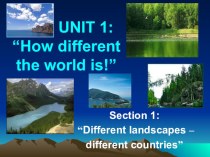- Главная
- Разное
- Бизнес и предпринимательство
- Образование
- Развлечения
- Государство
- Спорт
- Графика
- Культурология
- Еда и кулинария
- Лингвистика
- Религиоведение
- Черчение
- Физкультура
- ИЗО
- Психология
- Социология
- Английский язык
- Астрономия
- Алгебра
- Биология
- География
- Геометрия
- Детские презентации
- Информатика
- История
- Литература
- Маркетинг
- Математика
- Медицина
- Менеджмент
- Музыка
- МХК
- Немецкий язык
- ОБЖ
- Обществознание
- Окружающий мир
- Педагогика
- Русский язык
- Технология
- Физика
- Философия
- Химия
- Шаблоны, картинки для презентаций
- Экология
- Экономика
- Юриспруденция
Что такое findslide.org?
FindSlide.org - это сайт презентаций, докладов, шаблонов в формате PowerPoint.
Обратная связь
Email: Нажмите что бы посмотреть
Презентация на тему Environmental problems of the modern world (Экологические проблемы в современном мире)
Содержание
- 2. The CONTENTSEcology. Environmental issues:- warming.- the ozone hole- water resources- destruction and deforestation- desertification
- 3. Ecology – a word composed of two
- 4. Everything is connected - reads the first
- 5. Environmental problems, which are expressed in violation
- 6. Disturbances of the natural environment depends on
- 7. ENVIRONMENTAL PROBLEMSLOCALREGIONALGLOBALThese problems require for
- 8. An example of a local environmental problem
- 9. Примером региональных экологических проблем может служить Кузбасс,
- 10. Still in an infinite Universe in an
- 11. Began in the second half of the
- 12. THE OZONE HOLENo less complex in the
- 13. "It is quite possible that by 2100
- 14. Water man pollutes from time immemorial. For
- 15. The deficit is getting clean water and
- 16. Destruction and deforestationEspecially great environmental threat is
- 17. DesertificationUnder the influence of living organisms, water
- 18. According to geologists, before people began to
- 19. According to the UN experts, the modern
- 20. Environmental pollution, depletion of natural resources and
- 21. Скачать презентацию
- 22. Похожие презентации
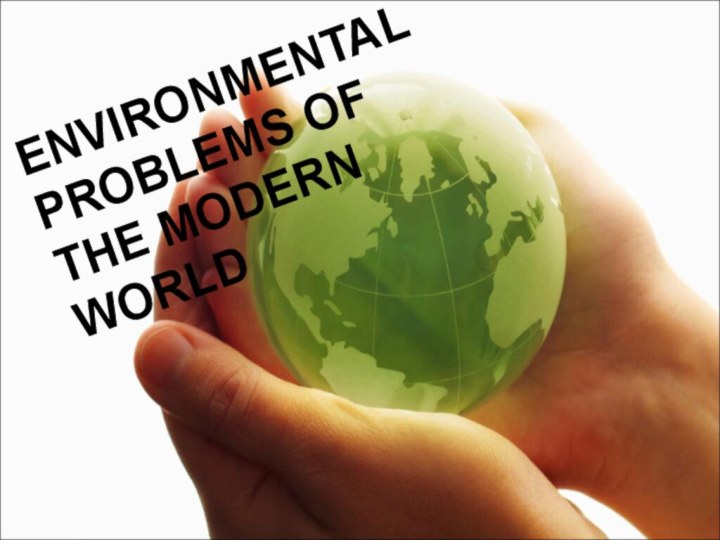

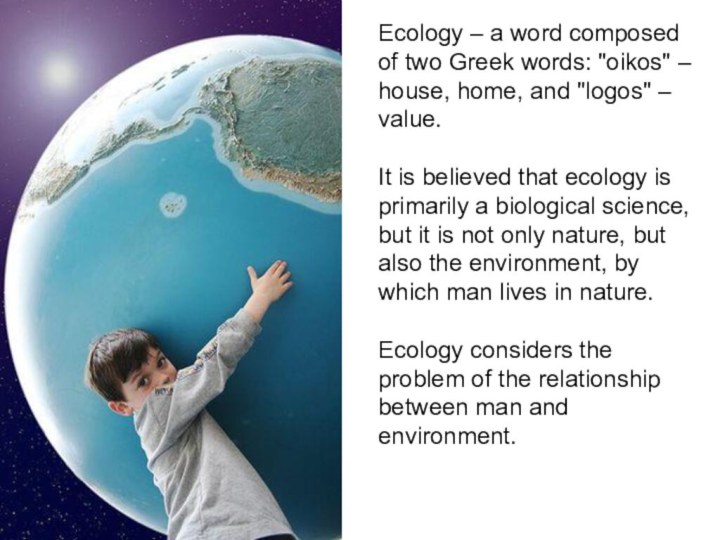
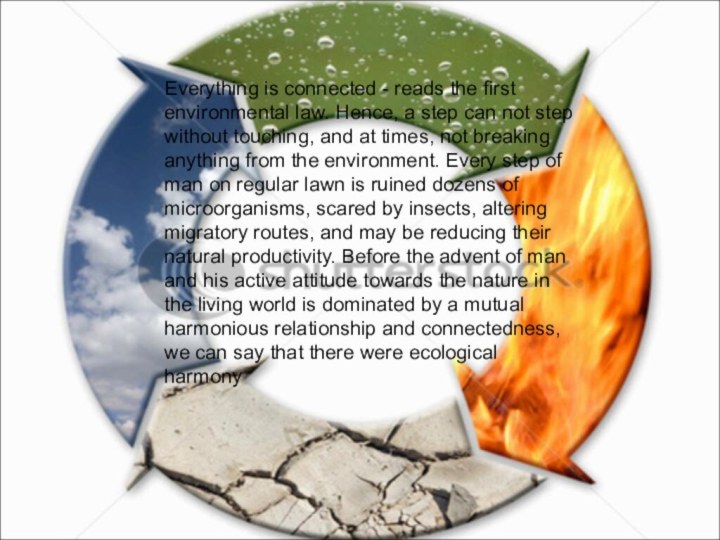
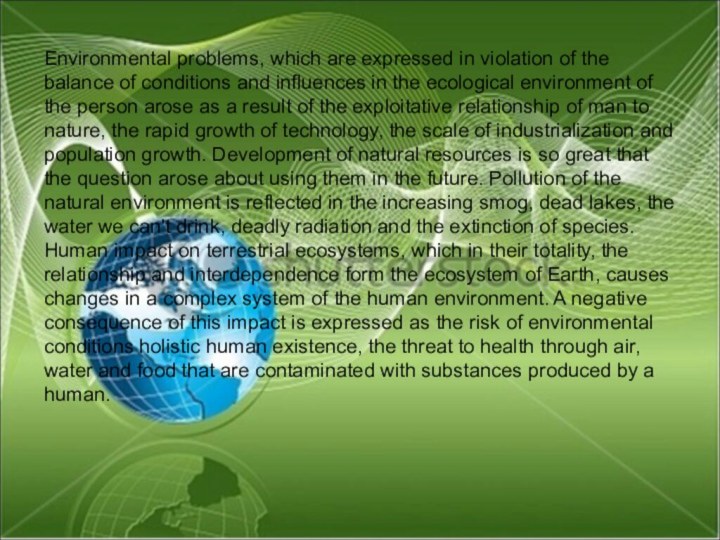
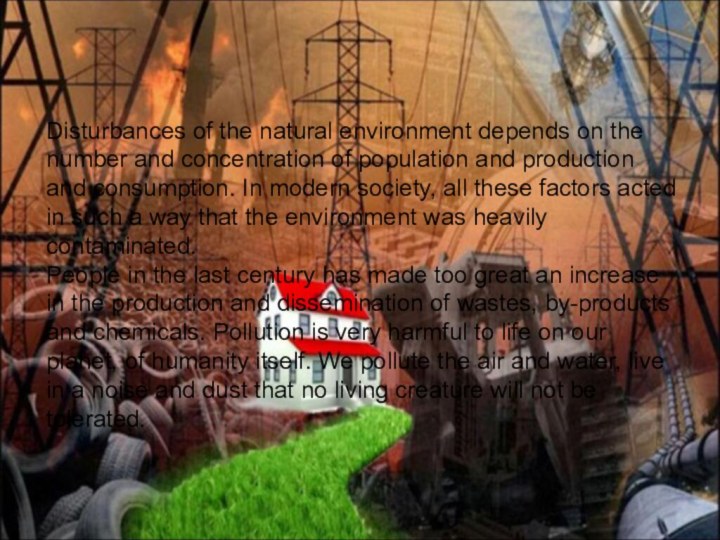
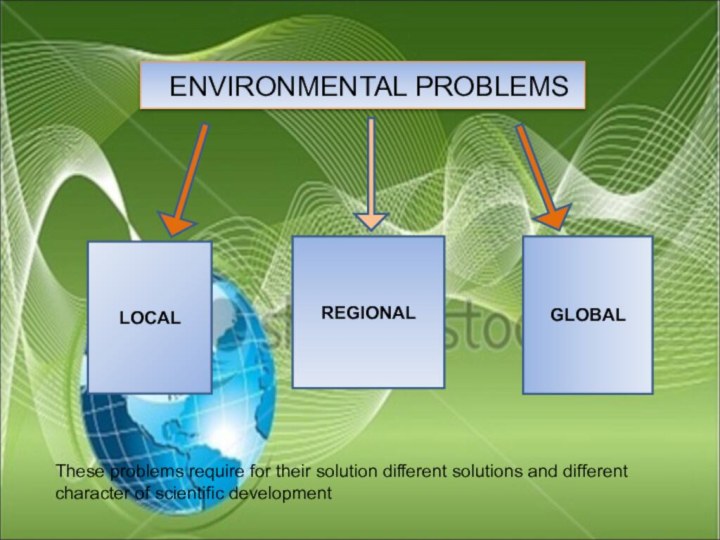
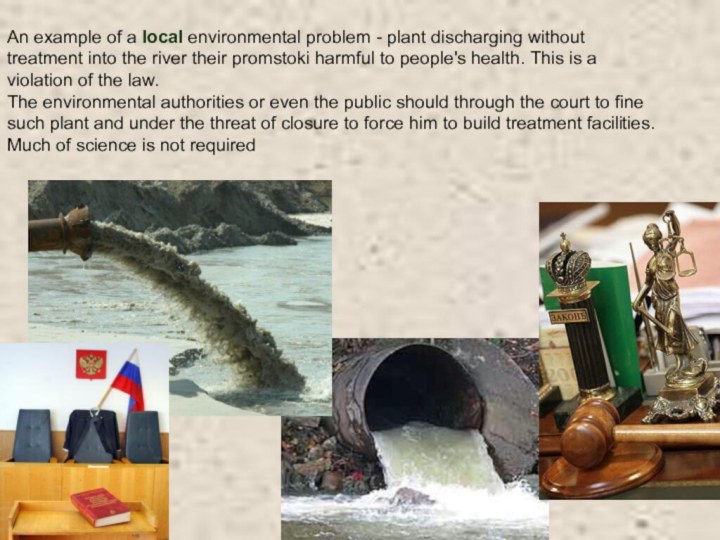
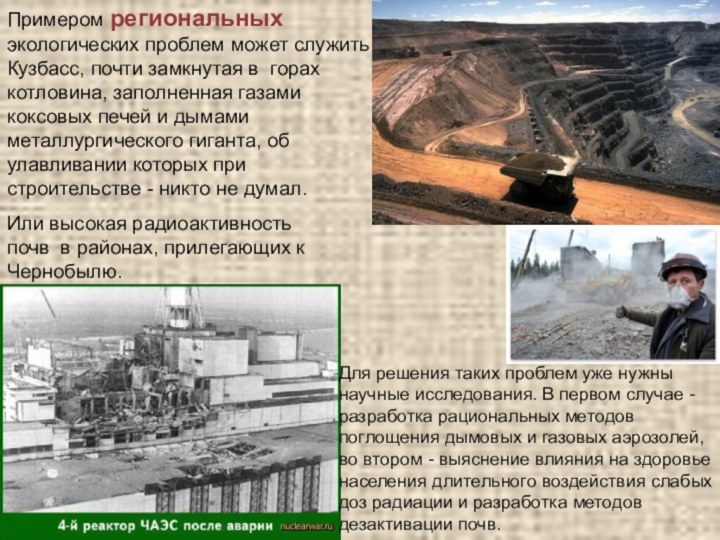

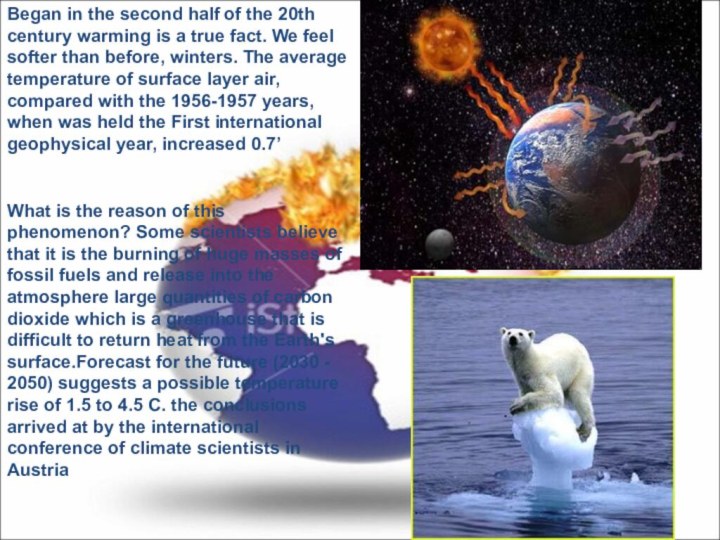


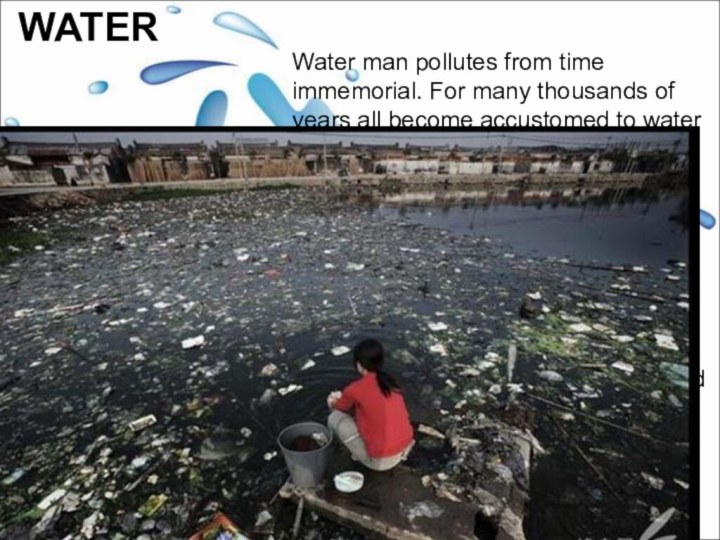
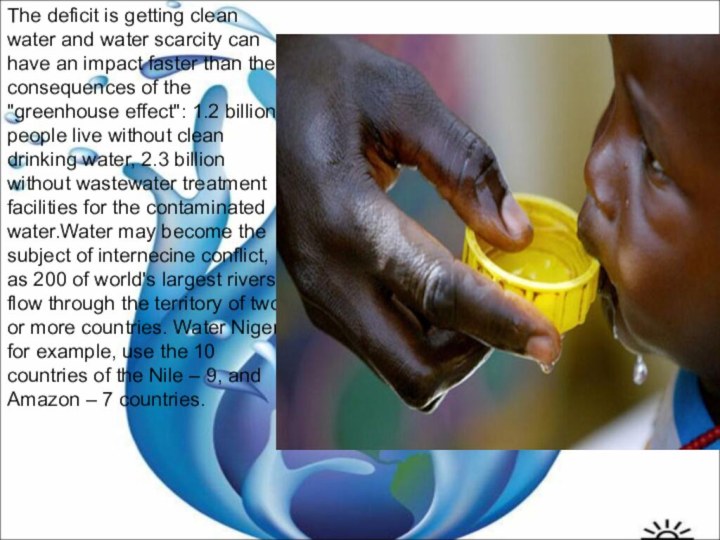
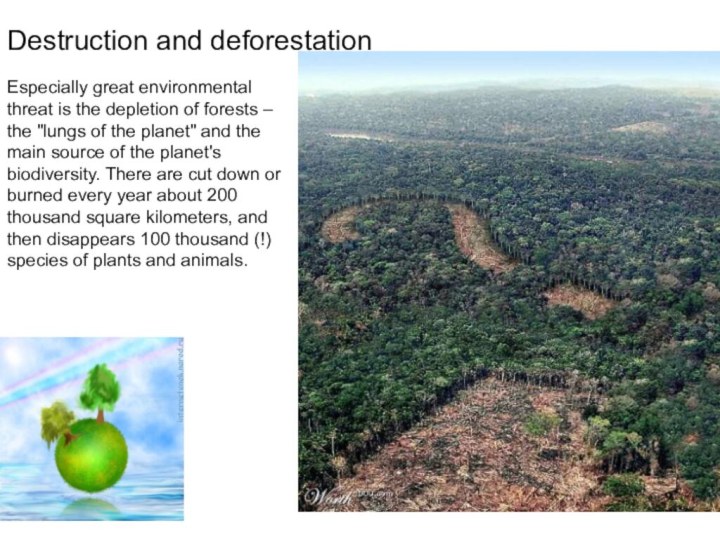
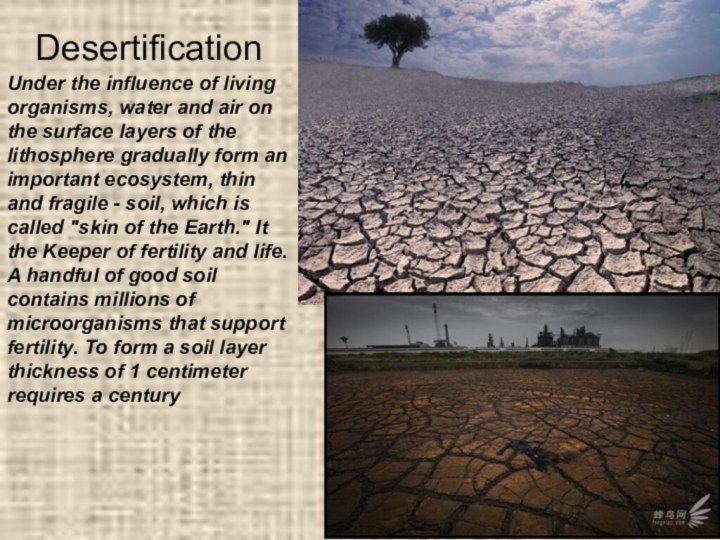
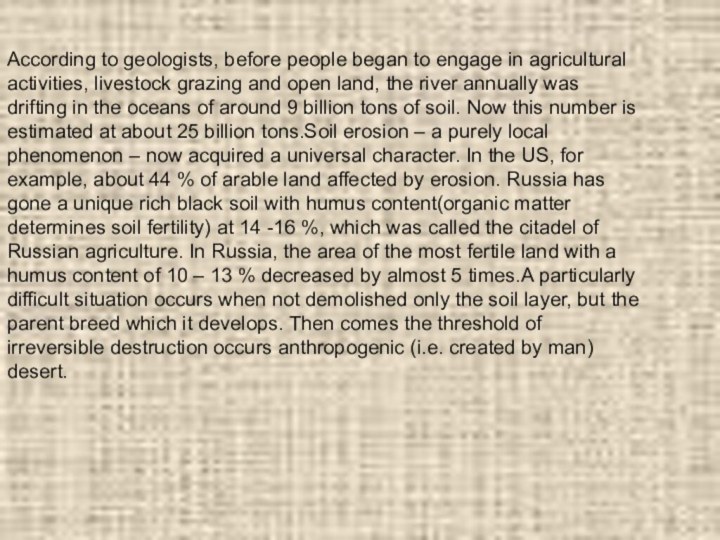
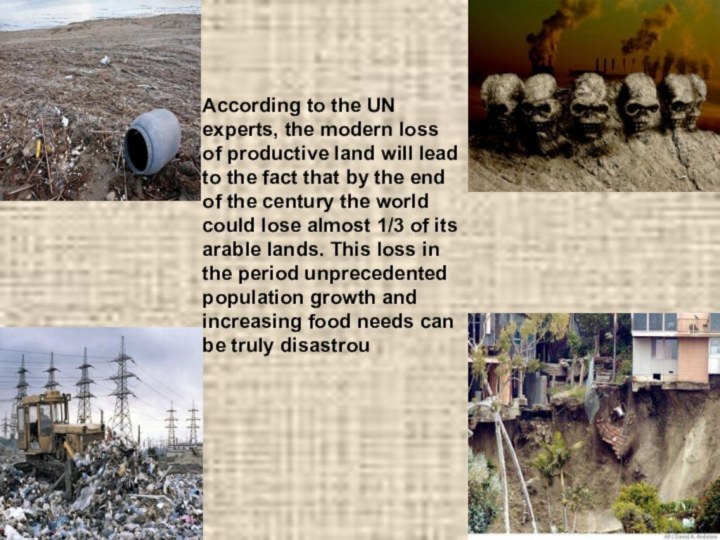
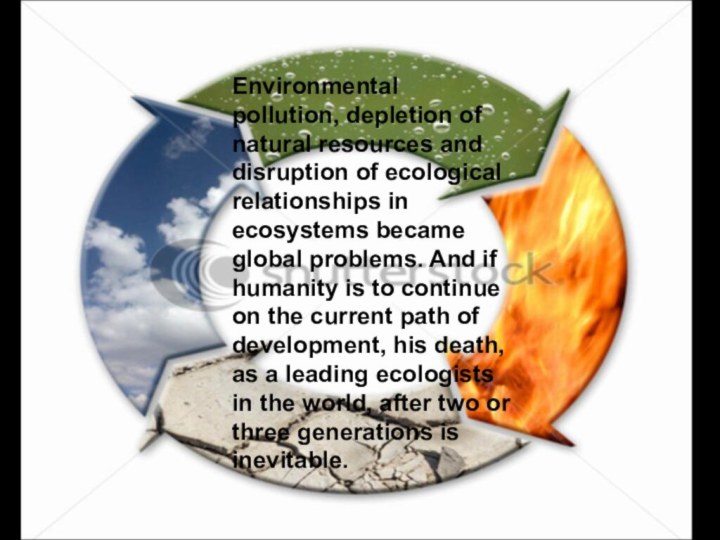

Слайд 3 Ecology – a word composed of two Greek
words: "oikos" – house, home, and "logos" – value.
It is believed that ecology is primarily a biological science, but it is not only nature, but also the environment, by which man lives in nature.
Ecology considers the problem of the relationship between man and environment.
Слайд 4 Everything is connected - reads the first environmental
law. Hence, a step can not step without touching,
and at times, not breaking anything from the environment. Every step of man on regular lawn is ruined dozens of microorganisms, scared by insects, altering migratory routes, and may be reducing their natural productivity. Before the advent of man and his active attitude towards the nature in the living world is dominated by a mutual harmonious relationship and connectedness, we can say that there were ecological harmonyСлайд 5 Environmental problems, which are expressed in violation of
the balance of conditions and influences in the ecological
environment of the person arose as a result of the exploitative relationship of man to nature, the rapid growth of technology, the scale of industrialization and population growth. Development of natural resources is so great that the question arose about using them in the future. Pollution of the natural environment is reflected in the increasing smog, dead lakes, the water we can't drink, deadly radiation and the extinction of species. Human impact on terrestrial ecosystems, which in their totality, the relationship and interdependence form the ecosystem of Earth, causes changes in a complex system of the human environment. A negative consequence of this impact is expressed as the risk of environmental conditions holistic human existence, the threat to health through air, water and food that are contaminated with substances produced by a human.Слайд 6 Disturbances of the natural environment depends on the
number and concentration of population and production and consumption.
In modern society, all these factors acted in such a way that the environment was heavily contaminated.People in the last century has made too great an increase in the production and dissemination of wastes, by-products and chemicals. Pollution is very harmful to life on our planet, of humanity itself. We pollute the air and water, live in a noise and dust that no living creature will not be tolerated.
Слайд 7
ENVIRONMENTAL PROBLEMS
LOCAL
REGIONAL
GLOBAL
These problems require for their
solution different solutions and different character of scientific development
Слайд 8 An example of a local environmental problem -
plant discharging without treatment into the river their promstoki
harmful to people's health. This is a violation of the law.The environmental authorities or even the public should through the court to fine such plant and under the threat of closure to force him to build treatment facilities. Much of science is not required
Слайд 9 Примером региональных экологических проблем может служить Кузбасс, почти
замкнутая в горах котловина, заполненная газами коксовых печей и
дымами металлургического гиганта, об улавливании которых при строительстве - никто не думал.Или высокая радиоактивность почв в районах, прилегающих к Чернобылю.
Для решения таких проблем уже нужны научные исследования. В первом случае - разработка рациональных методов поглощения дымовых и газовых аэрозолей, во втором - выяснение влияния на здоровье населения длительного воздействия слабых доз радиации и разработка методов дезактивации почв.
Слайд 10 Still in an infinite Universe in an orbit
around the Sun rotates non-stop a small planet Earth,
each new round of proving the inviolability of its existence. The face of the planet continually reflect satellites, the sending to Earth of space information. But the face of this irreversible change. Anthropogenic impact on nature has reached such proportions that problems of a global nature.Слайд 11 Began in the second half of the 20th
century warming is a true fact. We feel softer
than before, winters. The average temperature of surface layer air, compared with the 1956-1957 years, when was held the First international geophysical year, increased 0.7’What is the reason of this phenomenon? Some scientists believe that it is the burning of huge masses of fossil fuels and release into the atmosphere large quantities of carbon dioxide which is a greenhouse that is difficult to return heat from the Earth's surface.Forecast for the future (2030 - 2050) suggests a possible temperature rise of 1.5 to 4.5 C. the conclusions arrived at by the international conference of climate scientists in Austria
Слайд 12
THE OZONE HOLE
No less complex in the scientific
sense of the environmental problem of the ozone layer.
As we know, life appeared on Earth only after he has formed the security to the ozone layer, to cover her from the violent ultraviolet radiation. For many centuries there were no signs of trouble. The problem of the ozone layer arose in 1982, when the probe launched from a British station in Antarctica, at a height of 25 - 30[3] miles found a sharp decline in the ozone content. Since then, over Antarctica all the time is logged the ozone "hole" of varying shapes and sizes. According to the latest data, it is equal to 23 million square kilometers, that is, the area equal to the whole of North America.Слайд 13 "It is quite possible that by 2100 the
protective ozone blanket will disappear, ultraviolet rays sear the
Earth, animals and plants will die. People will seek refuge under the giant domes of artificial glass, and eat food of the astronauts“. According to experts, the changing climate will affect flora and faunaЧакалов Герман
Слайд 14 Water man pollutes from time immemorial. For many
thousands of years all become accustomed to water pollution,
but still there is something blasphemous and unnatural that the people throwing all the filth and dirt in those sources where he gets water to drink. Paradoxically, but also harmful emissions into the atmosphere, eventually finding themselves in the water, and the urban solid waste disposal and debris after each rain and after snow melting make their contribution to pollution of surface and groundwaterWATER
Слайд 15 The deficit is getting clean water and water
scarcity can have an impact faster than the consequences
of the "greenhouse effect": 1.2 billion people live without clean drinking water, 2.3 billion without wastewater treatment facilities for the contaminated water.Water may become the subject of internecine conflict, as 200 of world's largest rivers flow through the territory of two or more countries. Water Niger, for example, use the 10 countries of the Nile – 9, and Amazon – 7 countries.
Слайд 16
Destruction and deforestation
Especially great environmental threat is the
depletion of forests – the "lungs of the planet"
and the main source of the planet's biodiversity. There are cut down or burned every year about 200 thousand square kilometers, and then disappears 100 thousand (!) species of plants and animals.
Слайд 17
Desertification
Under the influence of living organisms, water and
air on the surface layers of the lithosphere gradually
form an important ecosystem, thin and fragile - soil, which is called "skin of the Earth." It the Keeper of fertility and life.A handful of good soil contains millions of microorganisms that support fertility. To form a soil layer thickness of 1 centimeter requires a century


















